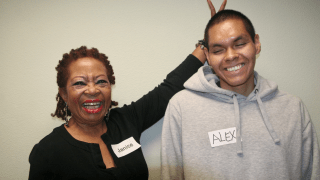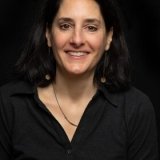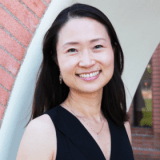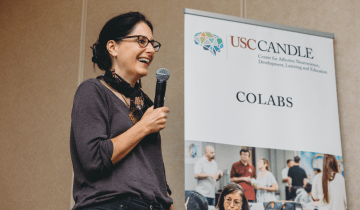Dreamers have been described as escapists, romantics and those who have their heads in the clouds. On the whole, these descriptors are not thought to be positive qualities, especially in school settings. But new research from Professor of Education, Psychology & Neuroscience Mary Helen Immordino-Yang is highlighting the utility of such deep and visionary thoughts. In recent studies, Immordino-Yang and her research team have explored whether thinking that transcends the here and now can not only provide teens with a way to connect with their elders through telling stories together, but also can increase their sense of purpose and wisdom.
Immordino-Yang’s study, conducted with her former student Rodrigo Riveros, examines several types of thinking that she terms “transcendent.” Other categories of thought that Immordino-Yang includes in this definition of transcendent thinking are recalling personal experiences, imagining the future, thinking about values and beliefs, and feeling emotions like compassion and gratitude.
Over the past several years, Immordino-Yang has studied how transcendent thinking influences adolescent development. Most recently, Immordino-Yang and a team of researchers at the USC Center for Affective Neuroscience, Development, Learning and Education (CANDLE) revealed that transcendent thinking is a predictor of adolescent brain development, above and beyond demographic factors. In another recent study, Mary Helen Immordino-Yang and her fellow researchers demonstrated that transcendent thinking helps protect low-socioeconomic status urban adolescents’ brain development from the effects of witnessing community violence. In the current study, Immordino-Yang, Rodrigo Riveros, Xiao-Fei Yang, and Maria Jose Gonzalez Anaya at CANDLE partnered with an intergenerational storytelling afterschool program called Sages and Seekers to explore the effect of transcendent thinking on teens’ sense of purpose.

The eight-week-long Sages and Seekers program brings together adolescents and elders from the same communities to share stories and reflect on their lives. Sages and Seekers operates its programs throughout the U.S. and internationally as well. The non-profit brings young people together with those from an older generation with a mission “to develop empathy, combat social isolation and dissolve age-related segregation within our communities, while meeting the universal and compelling need of both young adults and older adults to make sense of their lives.” They aim to fulfill this mission by “creating a sense of intergenerational community in our programs, through the art of authentic conversation.”
The space that the Sages and Seekers program creates—a place of meaningful friendship between teens and older adults—is particularly fruitful for adolescent transcendent thinking and purpose building according to Immordino-Yang. Transcendent thinking and a stronger sense of self are “fostered within the context of tight and caring relationships with close adults,” Immordino-Yang said. These types of intergenerational relationships “can provide adolescents with opportunities for healthy development, giving them a space to build meaning of life experiences, and from there to envision future possibilities,” she explained.
With funding from the National Endowment of the Arts, the John Templeton Foundation and the Thrive Center Telos Project, the research team at CANDLE crafted and conducted a study to measure how the adolescent participants in the Sages and Seekers program leveraged transcendent thinking throughout the program and how this facilitated their growing sense of purpose. At the beginning of the program, “seekers” (teens) and “sages” (older adults) circulated and got to know one another until they found a partner they would like to work with. The pairs then met for weekly sessions where they launched into guided discussions using prompts. Before and after the program, the adolescent participants completed surveys reporting their sense of purpose, wisdom and other factors. After each of the eight weekly sessions, they also recorded short video diaries reflecting on what they learned that day and how they felt. In the final weeks, on their own time, teens composed tributes honoring their older partner, which they read to the group on the final day.

Analysis of the surveys, video diaries and tributes revealed that teens increased their sense of purpose and wisdom throughout the program, and that their use of transcendent thinking in the video diaries and tributes contributed to these increases. They also found particular patterns of emotional meaning-making that led to powerful insights for the teens, in particular as teens reflected on the lessons they could learn from stories in which their partners recounted having struggled and overcome difficulties.
Reflecting on the study’s importance, Immordino-Yang explained that “a sense of purpose is fundamental to wellbeing across the lifespan, and especially so during adolescence, a developmental period of marked psychosocial potential and vulnerability. Patterns of thinking across adolescence not only organize brain development for emotional stability and wellbeing, but also are critical for a smooth transition to productive young adulthood.” The sages also benefitted, she notes. “Though we did not include these results in the current paper, the older adults also benefitted. They greatly enjoyed the program and increased their cognitive functioning, such as working memory.”
Immordino-Yang’s team’s study of the Sages and Seekers program “provides some insight into the ways that diverse adolescents from under-resourced neighborhoods increased their transcendent meaning-making through an opportunity to reflect on life experiences with an elder member of their community,” she said. The findings suggest that the program’s focus on building genuine and trusting intergenerational relationships around life stories “enabled youth to leverage emotional connections to their partner to dream about what their own future could hold, and what it would take to get there. Transcending the here-and-now, imagining the possibilities, supported their developing sense of purpose.”






